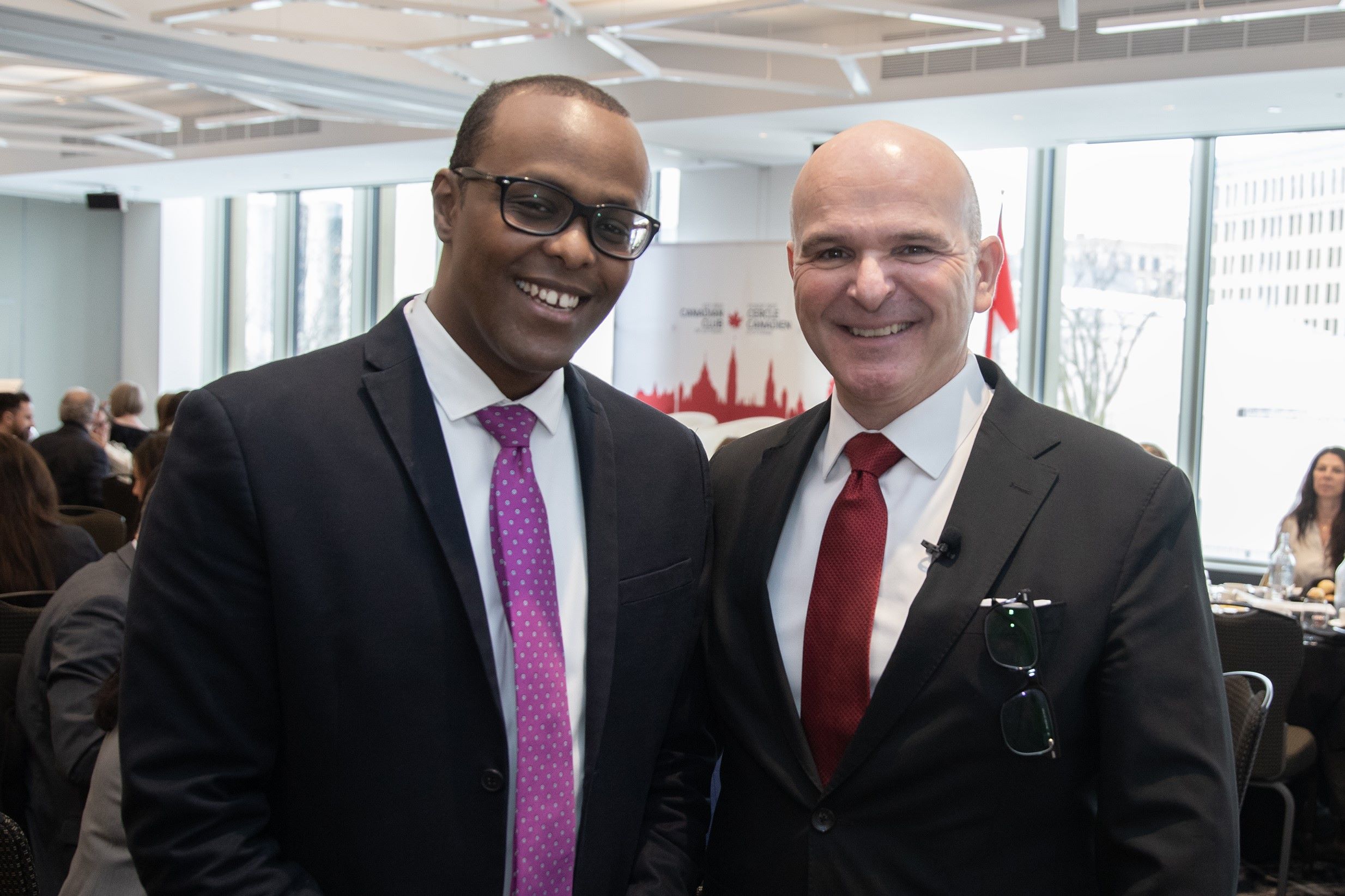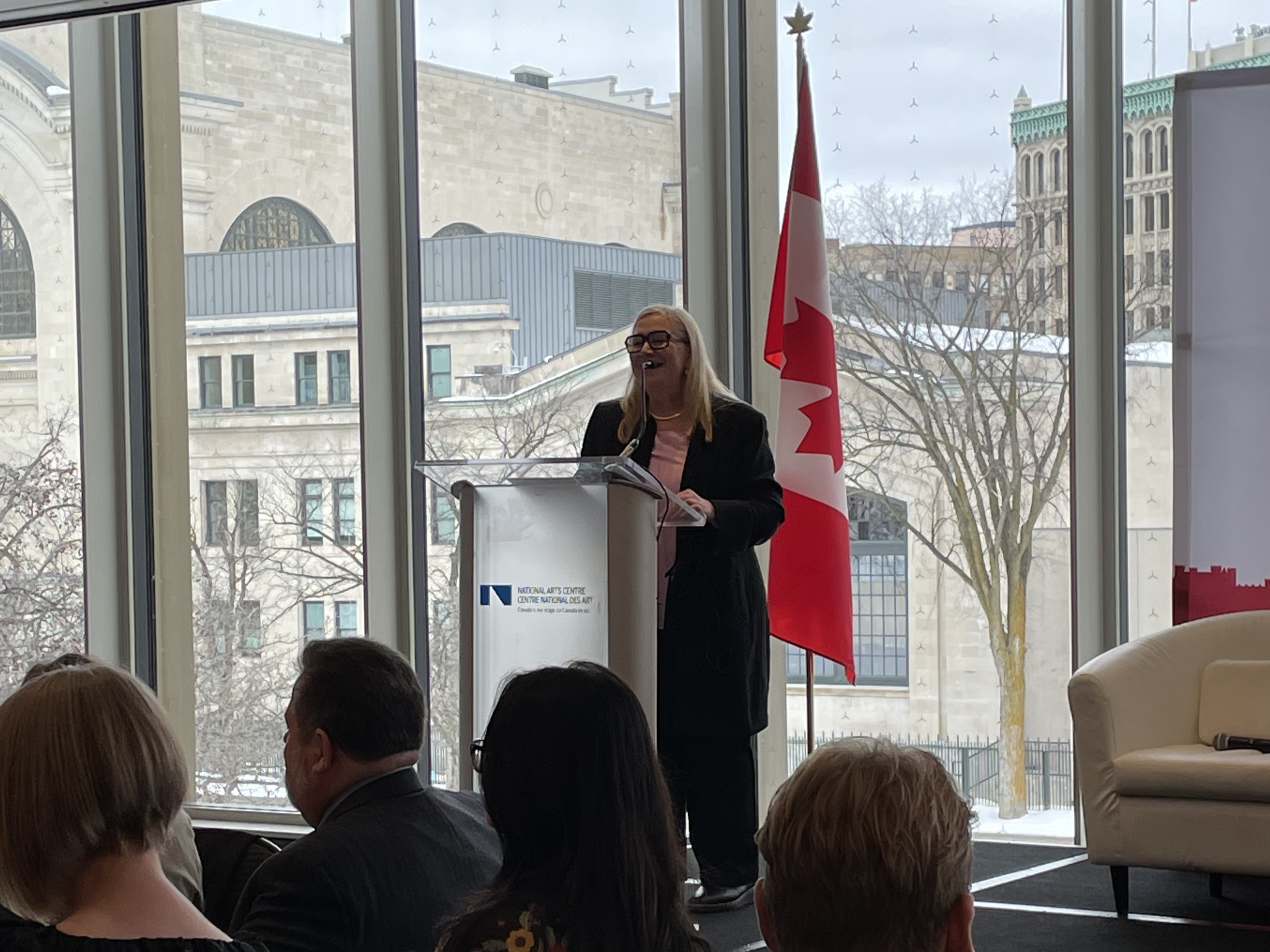Diversity, innovation and greenification are the future of work

Randy Boissonnault, Minister of Employment, Workforce Development and Official Languages and Dr. Mohamed Elmi Executive Director of the Diversity Institute at the Canadian Club of Ottawa’s Future of Work Event.
Innovation, sustainability and the future of work in Canada were hot topics for discussion at a gathering on Jan. 29, 2024 of more than 100 industry groups, associations, community groups and policy makers. Hosted by Jelly Marketing and the Canadian Club of Ottawa at the National Arts Centre in Ottawa, Ont., speakers delved into topics shaping what workplaces look like, including technology changes, an aging population, the shift to net zero, immigration, global migration and the critical role of small and medium businesses.
In his keynote address, Randy Boissonnault, minister of employment, workforce development and official languages, outlined the challenges and opportunities of creating a 21st-century labour force for Canada. “Last year alone as a country, we had $25 billion in unrealized economic value just due to skills vacancies,” he said, adding that Canada needs to be “strategic and disciplined” to meet these challenges and that previous approaches are insufficient, given the speed and pace of changes.
To achieve the productivity gains that are essential for economic growth, Boissonnault pointed to the importance of integrating business-led on-the-job training within Canada’s overall education system. “With the recent boom in foreign direct investment we can use this generational opportunity to train up entire sectors of the economy with the private sector,” he said.
The minister also emphasized the importance of inclusion.“We need to unleash all of the talent we have here. So that means helping more women, more racialized Canadians, more Indigenous Peoples, more persons living with disabilities, more seniors, more 2SLGBTQ+ Canadians and more youth access labour markets,” he said.
“We need to unleash all of the talent we have here. So that means helping more women, more racialized Canadians, more Indigenous peoples, more persons living with disabilities, more seniors, more 2SLGBTQ+ Canadians and more youth access labor markets,”
Poor recognition of international education credentials have long been a challenge for integrating internationally trained professionals into the Canadian economy. Boissonnault pointed to recent joint efforts by the Government of Canada and Saskatchewan to speed up the credential recognition process as a model for improvement across Canada. Internationally trained nurses in Saskatchewan can now have their credentials recognized in as little as 14 weeks, compared to the two to three years that it used to take.
He also signaled the growing importance of having workers with the right skills to create the sustainable economy of tomorrow. “Together, we inspire the youth of today to help build up the green economy that works,” he said.
Following the keynote address, Wendy Cukier, founder and academic director of the Diversity Institute (DI) and research lead for the Future Skills Centre (external link) (FSC), spoke about research on megatrends and their impact, the critical role of immigration in continuing to strengthen the economy and the skills needed to succeed.
“All workforce growth will come through immigration,” she said. In spite of recent claims and data about Canada’s immigration system, Cukier emphasized that the system is not broken; rather, it only needs to be tweaked.

Dr. Wendy Cukier Founder of the Diversity Institute and Research Lead for the Future Skills Centre speaking to the audience at the Canadian Club of Ottawa’s Future of Work Event.
She also noted that innovation, resilience and adaptability are key to building a strong and responsive skills and employment ecosystem, and also stressed the role of small and medium-sized enterprises (SMEs). Despite the focus on the needs of big businesses, SMEs account for nearly 90% of private sector employment. Large corporations have the resources to invest in skills and training; for example, RBC is spending $1 billion until 2030, but SMEs, the backbone of the economy, often lack the capacity to train and transform, whether in response to the demands for digitization, greenification or equity, diversity and inclusion (EDI). “We need to focus on their needs and building innovative responses,” said Cukier. She noted that SMEs account for 30% to 50% of greenhouse gas emissions but are often left out of strategies for the green transition. Just as the Canadian Digital Adoption Program is doubling down on SME digitization, we need to double down on SME greenification, said Cukier. Going forward, Cukier said that “All jobs will be green jobs and this needs to inform our approach to skills.” She cited the example of the FSC-funded learning management platform that has been developed with the Ontario Chamber of Commerce, Magnet and DI to serve the learning needs of SMEs and entrepreneurs.
“All jobs will be green jobs and this needs to inform our approach to skills.”
Cukier continued by noting the paradox of companies saying they have a labour and skills shortage when segments of Canada’s labour market are underemployed. “Fixing the skills mismatch is not just about giving job seekers the skills they need to succeed, but [it] also requires ensuring employers are not looking for skills in all the wrong places and hiring in their own image,” she said.
Businesses must be intentional about the skills and competencies they focus on, she underscored. “There is no doubt that increasing the participation of women and others in science, technology, engineering and math will be good for those sectors and our economy,” she said. “We must also recognize innovation is about doing things differently. Whether we are talking about digitization or greenification, we need to be laser-focused on technology adoption, on changing processes, on developing new products and services. This requires a wider range of skills and people who know about technology but are highly skilled in matching technology to organizational needs, in driving organizational and individual change.”
Then, Darian Kovacs, founding partner of Jelly Digital Marketing, who has led strategies to transition Indigenous Peoples into e-marketing jobs, facilitated the panel discussion. Panellists discussed issues identified as central to charting the future of work. These included how technology is advancing education and providing new ways to access learning opportunities. They also spoke about what is working in partnerships between government, private sector and not-for-profits. Finally, they addressed corporate Canada’s desire to see more diversity in their workplaces, and how new partnerships are working to provide equitable access to training for equity-deserving groups.
Kelly Hoey, executive director of HIEC-ApprenticeSearch.com, explained how technology can help diverse people overcome barriers by connecting them, and emphasized the need for personalized attention: “It is mentorship and it's partnership and it’s people saying these are the barriers we can overcome; then we can come up with some common solutions to share issues.”
Kerry Smith, senior director of the Manitoba Métis Foundation, discussed the ways that technology is moving training in a different, positive direction. She reminded the audience that providers need to remember that a number of communities, including many Indigenous and rural communities, still don’t have connectivity. She noted that the lack of connectivity means that the knowledge that people in these communities can access is more limited.
Val Walker, CEO of Business + Higher Education Roundtable, focused on the need for better links between business and higher education to improve Canada’s lagging productivity. She said that leveraging the relationship between business and higher education can drive innovation that responds to the needs of advancing technology. She also noted that while coding and computer programmers are important, we need people who can interpret what technology means to a community.
Patrick Rouble, principal consultant at Transom Frame Consulting, echoed the importance of collaboration between all players in the training ecosystem. He noted that it has taken industry time to realize that they need to play a part in training workers in order to close the skills gap.